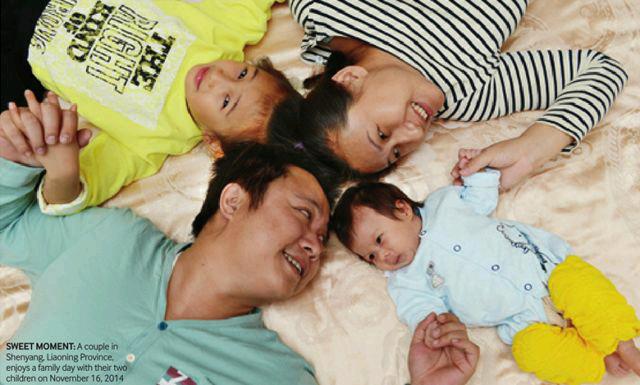No Baby Boom
By+Wang+Hairong
The policy allowing urban parents to have a second baby, so long as at least one of them is an only child, has been implemented in China for about a year. People worrying the policy might create a rapid population surge can exhale a collective sigh of relief.
From March 3, 2014, when the policy was implemented across the country until the end of 2014, only 1 million couples eligible to have a second child applied to do so, according to a statement by Mao Qunan, spokesman of the National Health and Family Planning Commission, during a press conference on January 12.
He said that this number is within the expectation that no more than 2 million children would be born every year under the policy.
Nationwide, 15 million to 20 million couples who are at child-bearing age and already have their first child are eligible to have a second child under the policy, said Zhai Zhenwu, a sociology professor with Renmin University of China and Vice President of the China Population Association.
That indicates that so far, only about 5 to 6 percent of these eligible couples in the country have submitted applications.
The 2014 was the first year that the policy was implemented, and it will take families some time to get ready for a second baby, so it is predicted that in 2015, more eligible couples will submit applications, Mao said.
Within expectations
The new policy was adopted in November 2013. It made a significant adjustment to the family planning policy introduced in the 1970s to curb the population explosion that China was experiencing at the time.
Before the introduction of the new policy, some exceptions to the one-child policy had already been made. Rural couples with a female or handicapped first child, families in which both parents are only children, and ethnic minority couples are also allowed to have second children.
The new policy will mainly affect urban couples at child-bearing age, Zhai said.
The policy was first implemented in east Chinas Zhejiang Province on January 17, 2014, and soon rolled out across the nation.
From January to the end of December 2014, Zhejiang received 88,056 applications, of which 85,648 were approved, according to the Health and Family Planning Commission of Zhejiang Province. During the 12 months, 26,974 babies were born to eligible couples there.
Pan Zuguang, an official in the Zhejiang provincial commission, said that a survey conducted in June 2014 showed the province had 632,300 eligible couples, and by the end of the year, 12 percent had submitted applications. He said that 85.68 percent of the female applicants were between 25 and 34 years old.
Before the policy was launched in the province, it was estimated that 95,000 couples would like to give birth to a second child in 2014, and in the first five years after the implementation of the policy, an annual average of 80,000-90,000 babies would be born under the policy, Pan said.
In the first half of 2014, a total of 310,000 babies were born in Zhejiang, only 3,401 of which were born to eligible couples under the new policy.
On January 11, 2015, the Beijing Municipal Commission of Health and Family Planning also released relevant data. At a press conference held on that day, the commissions spokesman Zhong Dongbo said that since Beijing implemented the policy on February 21, 2014, a total of 30,305 couples submitted application under the policy, and 28,778 applications were approved between then and December 30, 2014.
Zhong estimated that the couples submitting application according to the new policy accounted for approximately 6.7 percent of total eligible couples in the city.
He said the number of applications was lower than the expected 54,200 annually. However, he said that it is likely to take three to five years to see the effect of the policy, because some eligible couples not submitting applications may choose to do so later.
Some couples in their 20s and early 30s, the demographic group mostly likely to be eligible, have just had their first child or have no children.
An eligible Beijinger born in 1980 said that right now, he is preoccupied with taking care of his first child, who just turned 1 year old. Having a second child is not yet on his or his wifes agenda.
Besides, in places such as Beijing, Tianjin and Chongqing municipalities and Sichuan Province, after the birth of their first baby, a couple is required to wait for three to four years to have the second one, unless the mother is above a certain age limit, usually 28 years old.
In Shanghai, the situation is similar. Currently, 90 percent of women in child-bearing age are eligible to have a second baby, yet less than 5 percent of eligible couples submitted applications in 2014, said Pan Hua, an official with Shanghai Municipal Commission of Health and Family Planning.
Why not two?
In November 2014, China Youth Daily surveyed 2,052 residents across the nation, asking eligible respondents the reasons for not submitting an application.
Respondents reported that the top reasons for not having another baby are “the economic cost of child-rearing is too high,”“the time cost of child-rearing is too high,”“one child is enough,” and “I need more time to think about it.”
Another survey conducted in Shanghai showed that the annual cost of child-rearing is more than 30,000 yuan ($4,839). It was estimated that, from birth to university graduation, a child costs more than 1 million yuan ($163,399).
A man surnamed Chen and his wife Li, both born in the 1980s, told Ningbo Evening News that they cannot afford to have another child. Chen was an only child, so now they can have a second baby, but Li thinks that having a second child will lower their living standard.
Li said that, although they are a working couple, they would like to save money to give their son a good life and education. She planned to bring her son to tour some Southeast Asian countries this year, then put aside money to send him to receive an education overseas in the future.
For some couples that can afford the economic cost, the time cost is high enough to put many off. Yu, a 34-year-old man in Ningbo of Zhejiang Province and his 33-yearold wife Shi are one such couple. Yu is a businessman with a decent income. They had their daughter in 2006.
Shi once wanted to have a second baby, but after her daughter went to primary school, she changed her mind. Her daughter was enrolled in four after-school classes, including calligraphy, dancing, music and the game of go. Shi had to accompany her to all these classes. She said that she would like to focus her mind on bringing up her daughter well, and has no energy to take care of a second baby.
Some women are reluctant to have a second baby because they think that would affect their career development, Pan said. She said that in Shanghai, women on average give birth to their first baby around the age of 28, and they do not like to give birth to a second baby at a time so critical to their professional growth.

